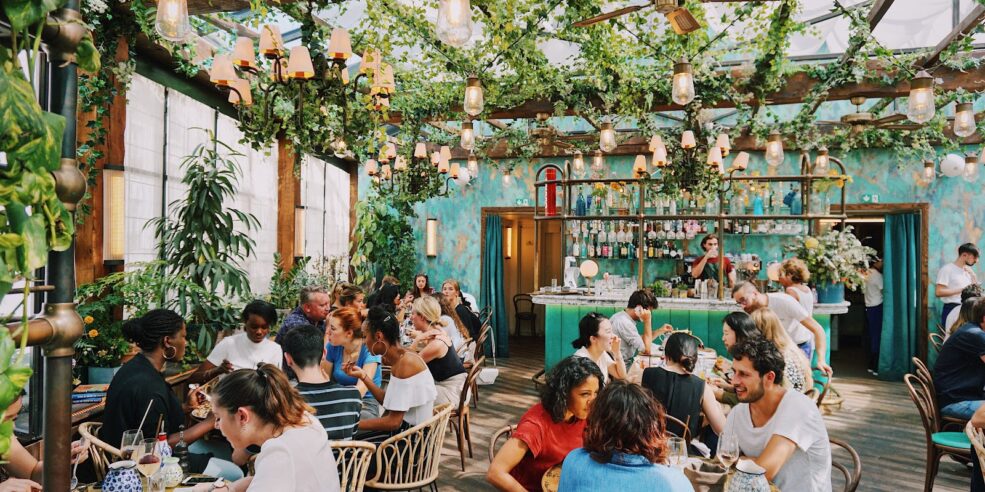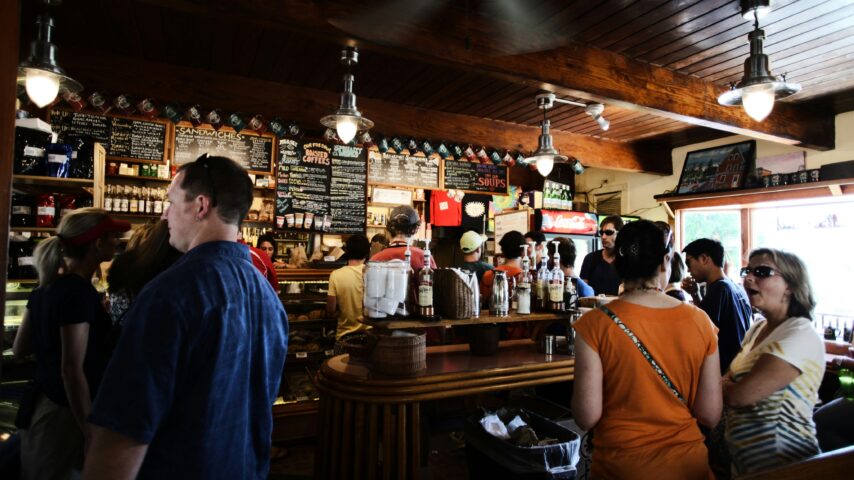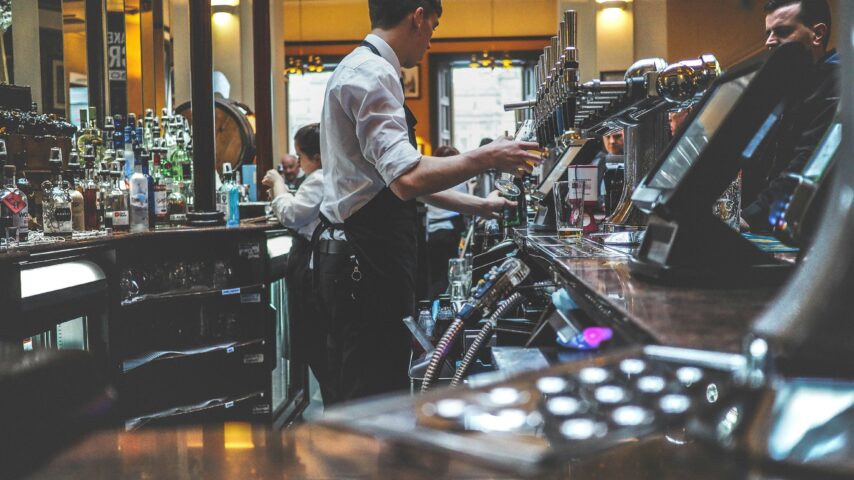The pandemic and subsequent lockdown have obviously put the hospitality sector in a difficult position. Although it was undoubtedly the right decision to shut down restaurants, pubs, bars and cafes as a matter of public safety, the loss of business struck the sector, unlike any other industry in the UK. This time has served to emphasise the precarity of running a restaurant: hospitality has always been a tight-margin business, with operators having on average less than 3 weeks of cash on hand. This means that any small disaster can set off a whole chain of them. Governmental support was used to curb the impact of the pandemic on the industry and landlords.
But how did this happen? Beyond being a customer-driven business, restaurants in the UK have had to deal with extraordinarily high rents, driven by upward-only five-yearly rent reviews as well as being hit with government taxes that larger online-based corporations are often able to circumvent. Add in a pandemic and you’ve got a perfect storm. The industry has done an amazing job of holding everything together these past couple of months, the amount of grafting and hard work put in has been awe-inspiring.
The last few months have sketched out a path to making running restaurants more sustainable in the long run. By reducing the tax burden and landlords moving to turnover based rents hopefully the hospitality industry, the third largest employer in the UK, can come out stronger at the end of this.
Governmental support
Pre-pandemic
Pre-pandemic, in some cases restaurants were giving more than 50 pence in every pound earned to the government in one way or another. Now, I’m not saying that these businesses shouldn’t be taxed, of course they should be, but what many people don’t realise is quite how much pressure small hospitality businesses are under.
Pre-pandemic, restaurants were faced with paying 20% VAT on their sales. The UK is actually one of the countries in the EU that doesn’t have a reduced VAT rate for the hospitality sector. Other countries have lowered their rates to encourage tourism and economic growth, something that hasn’t been accepted in the UK.
On top of that, business rates can be astronomically high as rateable value is determined by how much you pay in rent and businesses are expected to pay between 40 and 50% of that value. It’s no secret that rent has been soaring over the last few years, meaning that business rates were rising at the same rate. Then, unlike private tenants, commercial occupants also have to pay for rubbish collection which amounts hundreds of pounds a month if you think that often you’re paying a pound per bag.
Furthermore, restaurants are seemingly bearing more than their fair share of the weight of the economy as these businesses pay their full tax obligations, whereas huge corporations like Apple, Google and Amazon can find loopholes and significantly reduce their tax burden. Companies that take in billions in revenue should have to do their part to support this economy as well.
Unfortunately, the shift to an online-based retail model has meant that a lot of business has been set apart from the traditional taxation structure, which has caused local businesses to be disproportionately damaged. Spreading the cost across all businesses will mean less of a burden on smaller hospitality companies while providing increased taxes for the government – a win win.
Pandemic Support
It has to be said that the government’s support of hospitality has been admirable. Other than the week in March where customers were discouraged from going to restaurants but restaurants were not mandated to close, it seems that they have done everything they could to support these businesses.
All of hospitality is exempt from business rates this tax year and businesses with a rateable value between £15,000 and £51,000 were given £25,000 cash grants. As mentioned above business rates can be debilitating and an exclusion here shows that perhaps they never had to be that high in the first place. On top of that, VAT has been slashed from 20% to 5% giving operators the choice to either pass those savings on their customers or use the money to help their business stay afloat longer.
The furlough scheme has also been a real winner over these past few months saving a huge amount of jobs that operators simply wouldn’t have had the ability to keep on. There was of course a lot said about the fact that tronc wasn’t included, but that has at least encouraged a conversation about the viability of using tronc to top up wages in the first place. It is horrible that those whose salaries are partly made up of tronc have had to take huge pay cuts during this period when others haven’t had to, but it’s a very complicated issue both for their employers as well as for the government (listen to our podcast episode with Barak Peled for a more nuanced look at the whole idea of tronc).
Where the government has perhaps faltered a bit has been in their response to rent. They have announced a rent moratorium until the end of September (for now), however they haven’t put anything in place to stop landlords from demanding all of their rent including for the period of the lockdown on September 30th and evicting tenants if they are unable to pay. We’ve already heard that some restaurants, such as 18-year-old institution Milk and Honey, will be closing at the end of September as they have been unable to reach a compromise with their landlords. This is such a shame especially when we’ve seen other countries do their best to avoid these situations. In Canada, for example, the government has agreed to pay 50% of all small commercial tenants’ rent, have asked the landlords to absorb 25% and the tenant pays the remaining 25%, giving tenants far more breathing-room.
What should the future look like?
There are some big questions to consider for the future. Why not keep business rates to a minimum and VAT at 5% and collect that revenue in other ways? Plus it’s been made very clear that restaurants operate as community hubs and are the means to the survival of the high street. Retail has already been affected by online giants such as Amazon (who by the way don’t pay any VAT at all) and in London, the introduction of the £15 congestion charge every day of the week makes it even less appealing to travel into the centre, especially as the government wants to minimise the use of public transport during the pandemic. Restaurants have to be the draw so why not reward the businesses for doing their part for the economy?
If we go back to the same rates and taxes as before, a huge number of restaurants will certainly close and that doesn’t only affect the 3 million people who work in the hospitality sector. Restaurants are part of a circular economy which includes farmers, suppliers, wholesalers, logistics companies and more. If restaurants shut, all of these businesses are affected, something that I don’t think many people took into consideration before the pandemic. But with the amount of wholesalers having to pivot to a B2C model in order to keep the doors open, many more people are aware of how the supply chain works and it would be a real tragedy to lose that as well.
We might actually need some more changes to come into effect, such as a lowering of national insurance. Typically, governments tax things that should be discouraged (eg alcohol, cigarettes), however, when it comes to employing people the government asks for 13.8% of what you pay your team. Yes, employers will get £1,000 per furloughed employee they keep on until January 2021, but that doesn’t come close to what it will cost to keep them. This is especially pertinent in hospitality where you do need more manpower than most industries – running a restaurant simply cannot be done by yourself.
It’s very clear that what people missed the most during lockdown was the opportunity to go out for food or a drink and get together with friends and family and break bread. Throughout the history of humanity this has been key to creating bonds and making communities stronger. It would make sense for the government to reward the establishments that enable this.
Landlords
Pre-pandemic
As touched upon in the earlier section, rents have risen stratospherically over the last decade or so. A driving factor of this has been upward-only five-yearly rent reviews. These agreements mean that rents can only go up and reviews are usually based on whatever the latest lease has been in the area. Because of this, some premises who had a rent-review in December 2019, before the pandemic struck the UK, are seeing their rents go up by 70%! And this then has the knock on effect of raising your business rates as well.
Additionally, landlords are given tax breaks if a property is unoccupied meaning that it can be more beneficial to evict tenants if they don’t agree to their increase and have the property stay empty because empty properties are exempt from business rates for 3 months. And while the government has said it’s illegal to evict anyone for lack of payment before September 30th, many landlords are unwilling to negotiate with tenants and want their back payments in full by then. Currently restaurants are trading at about 70% of what they were at this time last year and as such it is mathematically impossible for tenants to pay back what they owe and still continue to operate. Something clearly has to change.
The way forward
There is a clear answer to this conundrum and that’s turnover-based rent. Many operators including the likes of Pret a Manger and Wasabi are pushing for this type of agreement where rent depends on how much business is coming through: a win win for everyone. Several landlords, including the Crown and Cadogan Estates, have already put forward plans for this type of lease meaning that many Central London restaurants have had their futures made easier. However, many landlords haven’t and are refusing to be even a little flexible.
Flexibility is going to be key to supporting the industry. And like it or not, commercial landlords need restaurants. There’s a huge amount of development going on, especially in London, and the way to attract buyers is by enabling a community, at the centre of which are restaurants. Big, brand new developments like Battersea Power Station rely on their commercial tenants to bring in the private ones. If these developers can’t budge on their rent, they won’t have anything to offer.
The days of huge rents being accepted because foot traffic was certain and generally high are also behind us. Many of the workers that used to flock to city centres every day and pick up coffees, quick lunches and afterwork drinks are no longer there. Working from home has become the norm and it’s doubtful that a full week in the office will ever return, with huge employers like Twitter and Amazon extending their new work from home policies into at least 2021 if not forever. There will be a definite shift from urban to suburban when it comes to popular locations and landlords need to see that.
Conclusion
This lockdown period has shown us how things could be and going back to the ways of the past doesn’t look to be an option anymore – people won’t stand for it. We’ve clearly seen that there is scope for support and perhaps both the government and landlords have also been surprised that they can forget about the austerity of the past and be a little more accommodating in the future. I have to say I’m hopeful that they see the benefits and continue the way they have been, but only time will tell.




